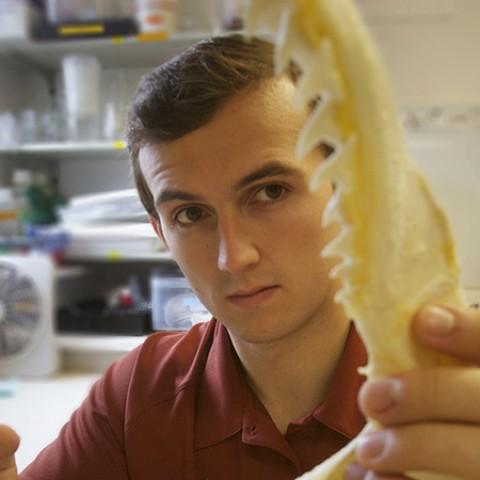


《约瑟夫·兰根与海
Joe 兰甘过世 ’15 knew he wanted to be a marine biologist ever since he was a small boy. He’s been a fisherman for as long as he can remember. 背上背着一个行李架, Joe’s father Dave frequently took his infant son along on fly-fishing trips along the banks of the Delaware River, near their 家庭 camp in the Catskill Mountains of New York. 兰甘过世 says wryly, “I was hooked,” and the shared father-son passion continues to this day.
But it was a second-grade school project that provided 兰甘过世 with the “ah-hah” moment that sealed his career fate. The project was entitled “Flat Stanley,” based on a character from a popular book of the same name. Schoolchildren created and mailed a hand-colored paper doll to people around the country–friends, 家庭, celebrities–asking recipients to document and report back on Flat Stanley’s interesting experiences.
"I remember mailing Flat Stanley to my cousin who was working on a 研究 vessel in Florida. He sent back a photo of himself and Flat Stanley on the boat, 被鱼包围, and I was so excited to realize that you could do that for a living; I knew that’s what I wanted to do.”
兰甘过世, now a University of New England Marine Biology/Mathematics double major, retains his child-like enthusiasm as he talks about his future career in fisheries sustainability and management. But make no mistake–this national Goldwater Scholar is flat-out serious about his academics, 研究, 以及实现梦想的重点计划.
“I love the mathematical side of managing fisheries…the quantitative ecology. We know we can’t possibly count all of the fish, but how can we save them?他沉思着说。.
兰甘过世 and UNE graduate student Connor Capizzano are working together on a National Oceanic and Atmospheric Administration (NOAA) grant-funded project led by associate professor of marine science James Sulikowski, Ph.D. They are 研究ing the impact that recreational fishing has on Atlantic cod, a commercially important species that has been overfished in New England for centuries, and whose population has failed to rebound under current management plans.
The recreational fishery accounts for about one-third of the cod landed in the Gulf of Maine each year, 但被扔回海里的鱼是被保留的鱼的两倍. 深海冷水鱼, cod are particularly susceptible to environmental factors, including increasing water temperatures due to climate change.
The UNE 研究 looks at the resulting discard mortality of cod populations. 兰甘过世 is developing mathematical mortality models while Capizzano assesses the human impact, and their results could be used to develop better management plans that ultimately rebuild Atlantic cod stocks.
兰根从未想过要主修数学, but the high achiever entered UNE with 27 transfer credits he earned through AP and college-level courses, 是苏里科夫斯基建议的, knowing the combination would be a tremendous asset. 兰甘过世 met briefly with mathematics associate professor Susan Gray, Ed.D. 在正规澳门赌场网络的第一个星期.
“她很善良,也很鼓励我 . . . 她用甜言蜜语说服了我. 我离开她的办公室时想,‘我刚刚做了什么?’” laughs 兰甘过世, adding, “But seriously, it was the best decision I ever made.” The dual major laid the groundwork for his continued academic success at UNE. 当国家海洋和大气管理局拨款给正规澳门赌场网络时, Sulikowski recognized it presented many opportunities for modeling, 兰根的专业和兴趣领域, 所以让他参与这项研究是合适的.
Being equipped to cast for opportunity when it arises is a finely honed trait 兰甘过世 developed years ago, 从“逃跑的人”身上吸取教训.” To prepare for his first saltwater fishing trip with his father at age 10, 他读了一些正规澳门赌场网络未来的文章, 要带什么, 以及要使用的装备.
兰甘过世 was fishing for striped bass using live eel as bait, best suited for a heavy, saltwater rod. “I had to use a spinning rod of mine designed for freshwater–so I protested, 但这是我的第一次, 我爸爸说, “会没事的.’ On our first night, I cast, felt a big tug, and hooked one…what are the odds? The fish took off and emptied the reel before breaking the line and off it went! 我看着爸爸说:“我早告诉过你。!’”
Future excursions were far more successful, and his vision never wavered. 兰甘过世 again has set his sights high in planning for graduate school and a career in fisheries management. Bridging what he perceives to be a communications gap between scientists, politicians and the public is something 兰甘过世 aspires to.
“I want to be directly involved with policy decisions, to help change things. Many species, along with the industry they support, are in trouble. We need to overcome the disconnect and work together to create a multidisciplinary solution, because we know what’s happening now isn’t working.”